MENU
(Nov. 30, 2017 - by Ralph Kurtenbach) Harold Goerzen may have typed out a few million words or so during a prolific career as a missions writer and editor. However, what one word is notable by its absence? It’s the first person pronoun, “I.”
 This is as it should be, according to the terse and efficient The Elements of Style, which urges writing that “draws attention to the sense and substance of the writing rather than to the mood and temper of the author.”
This is as it should be, according to the terse and efficient The Elements of Style, which urges writing that “draws attention to the sense and substance of the writing rather than to the mood and temper of the author.”
Goerzen is “amazing and greatly appreciated even if he is seldom recognized for the job he does,” according to Ron Cline, a global ambassador for Reach Beyond. Another missionary, information technology specialist Marlin Brubaker described him as a “very quiet, gentle worker” and a great ‘trombonist.’” (The latter comment refers to a unique ability possessed by Harold—that of using his lips to imitate a trombone. Each year at the mission’s Christmas party, he performs a few numbers.)
While writing is his profession, he comes from a musical family and often pulls out his clarinet to play in various bands and orchestras. He also enjoys singing in choirs, including a group called “Joyful Noise” that he and his wife, Linda, joined seven years ago, performing monthly in local care centers.
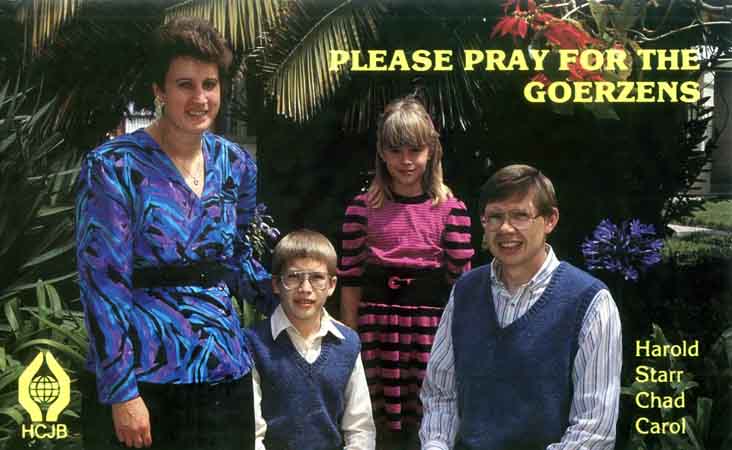 After 33 years, he plans to lay aside his powerful pen. In retirement, the Goerzens plan to move to British Columbia, Canada, to be closer to Harold’s elderly mother. The substance of Goerzen’s stories down through the years has centered on the efforts of others, not his own ambitions. He has reported on inaugurations (presidents, radio antennas and transmitters), expansions (a hydroelectric plant, a hospital and regional offices as the mission shifted its focus), and other changes large and small at Reach Beyond.
After 33 years, he plans to lay aside his powerful pen. In retirement, the Goerzens plan to move to British Columbia, Canada, to be closer to Harold’s elderly mother. The substance of Goerzen’s stories down through the years has centered on the efforts of others, not his own ambitions. He has reported on inaugurations (presidents, radio antennas and transmitters), expansions (a hydroelectric plant, a hospital and regional offices as the mission shifted its focus), and other changes large and small at Reach Beyond.
Interspersed with project stories were others featuring people who have found a relationship with Jesus. One former supervisor, Jon Hirst, said Goerzen wrote in “a disciplined, clear and concise way that would have made any newsroom in any major paper happy.” Dayna Garland, associate creative director for several years, said that “Harold consistently and humbly credits God’s hand for the gifts and talents he has been given.”
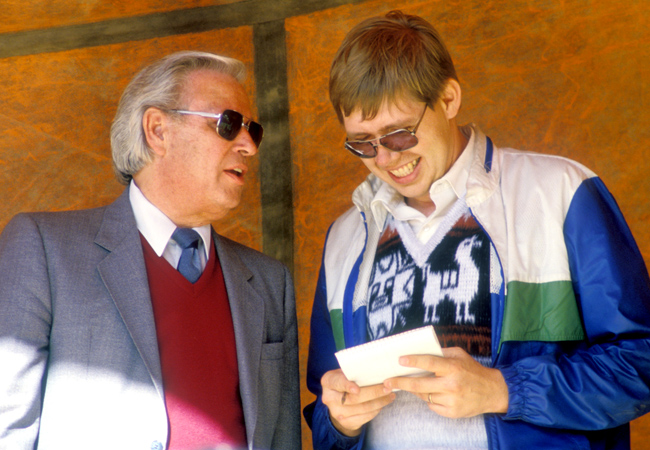 Goerzen’s accounts reveal to readers an eye for detail and an ear for good writing. His steadfast plodding as a worker behind the scenes has also demonstrated to colleagues, a heart to serve. “I highly respect Harold for doing that for so many years,” observed Curt Cole, the mission’s senior vice president who oversees the agency’s international ministries. “It’s a testimony to his deep belief in the organization.”
Goerzen’s accounts reveal to readers an eye for detail and an ear for good writing. His steadfast plodding as a worker behind the scenes has also demonstrated to colleagues, a heart to serve. “I highly respect Harold for doing that for so many years,” observed Curt Cole, the mission’s senior vice president who oversees the agency’s international ministries. “It’s a testimony to his deep belief in the organization.”
Cole has found that Harold masters a delicate balance between probing a story’s facts while safeguarding people’s identities in security-sensitive situations around the world. “There have been times when we’ve said, ‘Harold, you cannot take notes on this; it’s a high-security issue,’ and he’ll put his pen down,” Cole said. “But you know he’s anxious to pick it up and take notes.”
The careful reporting has demonstrated to donors for decades just how their missions giving went toward the expansion of God’s kingdom. Recently the mission’s content writer, Theresa With, asked Harold for a blog piece. Departing from his long-held tradition of objective news, he wrote in the first person, titling the article, Missions Then and Now: The Changing Face of Missions. Finally what emerged was a glimpse of Goerzen himself (https://reachbeyond.org/content/blog/read/missions-then-and-now-the-changing-face-of-missions).
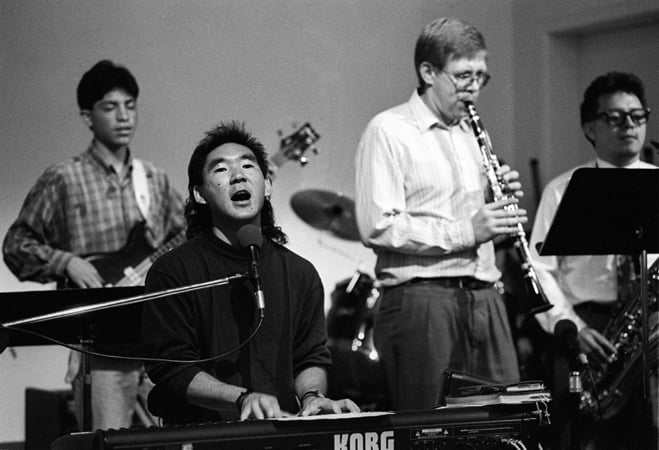 “I’ll never forget that day back in 1985 when I was a rookie missionary in Quito, Ecuador,” Harold began, continuing with how then-president Ron Cline announced what later became an inter-mission effort to put broadcasts into the native tongues of the world’s unreached people groups.
“I’ll never forget that day back in 1985 when I was a rookie missionary in Quito, Ecuador,” Harold began, continuing with how then-president Ron Cline announced what later became an inter-mission effort to put broadcasts into the native tongues of the world’s unreached people groups.
“I still get goosebumps as I recall him introducing the ‘World by 2000’ concept,” Goerzen recounted. With breaking news before him, he “felt inspired and motivated to do my part as a Christian journalist to get out the word about this exciting challenge and to urge others to get on board through their prayers, gifts and service.”
Cline says he finds in Harold “a silent doer of his job. Over the years he has kept the mission in the press without a whole lot of fanfare.”
“I would say my assignment has changed very little over the years,” Goerzen said, listing his responsibilities as editing publications, writing, some graphic design and photography.” On one occasion he accompanied Cline and others to Russia. There, in the nascent years of glasnost (increased openness and transparency in government institutions), the entourage learned from Christians how essential were the HCJB Russian-language broadcasts to church growth in an otherwise-closed country.
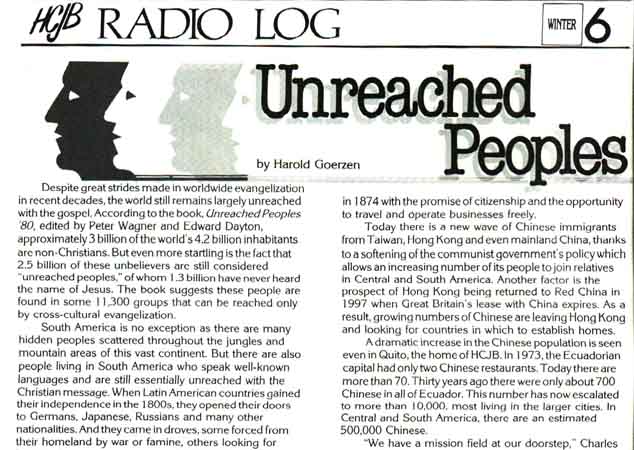 Goerzen also mentions being thrilled to interview missionary translators Catherine Peeke and Rosie Jung as well as Rachel Saint while reporting on the dedication of the first Waorani New Testament in Ecuador. (The book was printed at Imprenta Vozandes, operated by the mission in Quito.)
Goerzen also mentions being thrilled to interview missionary translators Catherine Peeke and Rosie Jung as well as Rachel Saint while reporting on the dedication of the first Waorani New Testament in Ecuador. (The book was printed at Imprenta Vozandes, operated by the mission in Quito.)
Harold wrote and his late wife, Starr, involved herself in hospitality. “One time the wife of Ecuador’s president came to HCJB in Quito, and Starr served the ‘individual quiches’ that she had made,” Harold recounted. “And she just loved those so much and asked for the recipe. Starr gave her the recipe and then I published it in our prayer letter [cleverly dubbed The Herald-Star].”
“As far as I know—according to [retired missionary writer] Kay Landers at least—I’m the first journalist they had on the staff,” Goerzen said. “I don’t know for sure if that’s true, but one of the first.” “If I remember correctly,” ventured retired missionary John Adams, “Carol and I interviewed the Goerzens for possible membership with HCJB when we lived in Alberta as Western Canadian representatives in the mid-1980s.”
Recalling his wordsmith career, Goerzen talks of stacks of stenographer pads full of notes. The notes became stories in mission magazines and other publications. He had come to Ecuador with advertising writing experience at The Lethbridge Herald, a daily in Alberta, and news reporting and editing savvy at The Rimbey Record, a weekly paper.
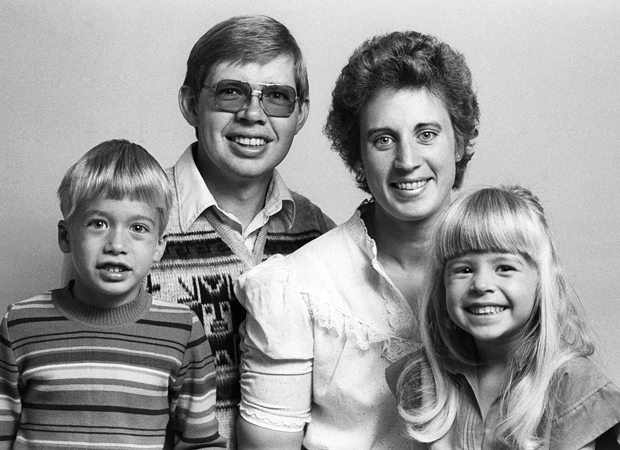 Before that, he had graduated in journalism at Lethbridge Community College, two years after earning a diploma in general Christian ministries from Prairie Bible Institute (PBI) in Three Hills, Alberta. While at PBI he met Starr who later became his wife and the mother of their two children, Chad and Carol. As a missionary in Ecuador, he took correspondence courses, completing a bachelor’s degree in communications from Trinity College in Deerfield, Ill.
Before that, he had graduated in journalism at Lethbridge Community College, two years after earning a diploma in general Christian ministries from Prairie Bible Institute (PBI) in Three Hills, Alberta. While at PBI he met Starr who later became his wife and the mother of their two children, Chad and Carol. As a missionary in Ecuador, he took correspondence courses, completing a bachelor’s degree in communications from Trinity College in Deerfield, Ill.
The Goerzens—after a decade in Ecuador—were transferred to the mission’s international headquarters in Colorado Springs, Colo., in January 1996. Just months later, Starr was diagnosed with an aggressive form of leukemia. Twice chemotherapy put the cancer into remission, but the leukemia kept coming back. In spite of total-body irradiation and a bone marrow transplant in Seattle to combat the disease, she died in March 1997.
He later married Linda, whose multiple sclerosis diagnosis has given Harold an opportunity to shine as a caregiver. “He has been amazing,” Cline observed. “They still go and enjoy times out even though it is a hassle to do.” Despite her illness, Linda has helped with special projects at the mission through the years and kept in close contact with the over 100 ministry partners who have financed and prayed for the Goerzens’ ministry at Reach Beyond.
 “He loves his family; he loves the Lord,” observed Cline. “He loves the mission…. Wow!” Goerzen is lauded by Cole for “not embellishing the truth; you knew that he was a high-integrity guy.”
“He loves his family; he loves the Lord,” observed Cline. “He loves the mission…. Wow!” Goerzen is lauded by Cole for “not embellishing the truth; you knew that he was a high-integrity guy.”
Priority Projects Director Beth Patton offers that the nickname “Hungry Harold” denotes that he is always asking for information. They may not always agree (gospel takes a capital ‘g’ or not) Patton said, but “I admire his longstanding heart’s desire to touch people’s hearts as they read about the way God is transforming lives.”
Countless times Goerzen has ended a public relations piece with “-30-”—a print journalism sign-off stretching back to the days of telegraph communications. Is retirement a -30- to his lengthy career as a missionary journalist? Yes and no. He is retiring but anticipates continuing to write for the mission agency on a part-time basis.
“He leaves an incredible legacy of documenting the history of HCJB/Reach Beyond through stories,” Patton said. “I will miss him incredibly.”
Source: Reach Beyond
 This is as it should be, according to the terse and efficient The Elements of Style, which urges writing that “draws attention to the sense and substance of the writing rather than to the mood and temper of the author.”
This is as it should be, according to the terse and efficient The Elements of Style, which urges writing that “draws attention to the sense and substance of the writing rather than to the mood and temper of the author.”Goerzen is “amazing and greatly appreciated even if he is seldom recognized for the job he does,” according to Ron Cline, a global ambassador for Reach Beyond. Another missionary, information technology specialist Marlin Brubaker described him as a “very quiet, gentle worker” and a great ‘trombonist.’” (The latter comment refers to a unique ability possessed by Harold—that of using his lips to imitate a trombone. Each year at the mission’s Christmas party, he performs a few numbers.)
While writing is his profession, he comes from a musical family and often pulls out his clarinet to play in various bands and orchestras. He also enjoys singing in choirs, including a group called “Joyful Noise” that he and his wife, Linda, joined seven years ago, performing monthly in local care centers.
 After 33 years, he plans to lay aside his powerful pen. In retirement, the Goerzens plan to move to British Columbia, Canada, to be closer to Harold’s elderly mother. The substance of Goerzen’s stories down through the years has centered on the efforts of others, not his own ambitions. He has reported on inaugurations (presidents, radio antennas and transmitters), expansions (a hydroelectric plant, a hospital and regional offices as the mission shifted its focus), and other changes large and small at Reach Beyond.
After 33 years, he plans to lay aside his powerful pen. In retirement, the Goerzens plan to move to British Columbia, Canada, to be closer to Harold’s elderly mother. The substance of Goerzen’s stories down through the years has centered on the efforts of others, not his own ambitions. He has reported on inaugurations (presidents, radio antennas and transmitters), expansions (a hydroelectric plant, a hospital and regional offices as the mission shifted its focus), and other changes large and small at Reach Beyond.Interspersed with project stories were others featuring people who have found a relationship with Jesus. One former supervisor, Jon Hirst, said Goerzen wrote in “a disciplined, clear and concise way that would have made any newsroom in any major paper happy.” Dayna Garland, associate creative director for several years, said that “Harold consistently and humbly credits God’s hand for the gifts and talents he has been given.”
 Goerzen’s accounts reveal to readers an eye for detail and an ear for good writing. His steadfast plodding as a worker behind the scenes has also demonstrated to colleagues, a heart to serve. “I highly respect Harold for doing that for so many years,” observed Curt Cole, the mission’s senior vice president who oversees the agency’s international ministries. “It’s a testimony to his deep belief in the organization.”
Goerzen’s accounts reveal to readers an eye for detail and an ear for good writing. His steadfast plodding as a worker behind the scenes has also demonstrated to colleagues, a heart to serve. “I highly respect Harold for doing that for so many years,” observed Curt Cole, the mission’s senior vice president who oversees the agency’s international ministries. “It’s a testimony to his deep belief in the organization.”Cole has found that Harold masters a delicate balance between probing a story’s facts while safeguarding people’s identities in security-sensitive situations around the world. “There have been times when we’ve said, ‘Harold, you cannot take notes on this; it’s a high-security issue,’ and he’ll put his pen down,” Cole said. “But you know he’s anxious to pick it up and take notes.”
The careful reporting has demonstrated to donors for decades just how their missions giving went toward the expansion of God’s kingdom. Recently the mission’s content writer, Theresa With, asked Harold for a blog piece. Departing from his long-held tradition of objective news, he wrote in the first person, titling the article, Missions Then and Now: The Changing Face of Missions. Finally what emerged was a glimpse of Goerzen himself (https://reachbeyond.org/content/blog/read/missions-then-and-now-the-changing-face-of-missions).
 “I’ll never forget that day back in 1985 when I was a rookie missionary in Quito, Ecuador,” Harold began, continuing with how then-president Ron Cline announced what later became an inter-mission effort to put broadcasts into the native tongues of the world’s unreached people groups.
“I’ll never forget that day back in 1985 when I was a rookie missionary in Quito, Ecuador,” Harold began, continuing with how then-president Ron Cline announced what later became an inter-mission effort to put broadcasts into the native tongues of the world’s unreached people groups.“I still get goosebumps as I recall him introducing the ‘World by 2000’ concept,” Goerzen recounted. With breaking news before him, he “felt inspired and motivated to do my part as a Christian journalist to get out the word about this exciting challenge and to urge others to get on board through their prayers, gifts and service.”
Cline says he finds in Harold “a silent doer of his job. Over the years he has kept the mission in the press without a whole lot of fanfare.”
“I would say my assignment has changed very little over the years,” Goerzen said, listing his responsibilities as editing publications, writing, some graphic design and photography.” On one occasion he accompanied Cline and others to Russia. There, in the nascent years of glasnost (increased openness and transparency in government institutions), the entourage learned from Christians how essential were the HCJB Russian-language broadcasts to church growth in an otherwise-closed country.
 Goerzen also mentions being thrilled to interview missionary translators Catherine Peeke and Rosie Jung as well as Rachel Saint while reporting on the dedication of the first Waorani New Testament in Ecuador. (The book was printed at Imprenta Vozandes, operated by the mission in Quito.)
Goerzen also mentions being thrilled to interview missionary translators Catherine Peeke and Rosie Jung as well as Rachel Saint while reporting on the dedication of the first Waorani New Testament in Ecuador. (The book was printed at Imprenta Vozandes, operated by the mission in Quito.)Harold wrote and his late wife, Starr, involved herself in hospitality. “One time the wife of Ecuador’s president came to HCJB in Quito, and Starr served the ‘individual quiches’ that she had made,” Harold recounted. “And she just loved those so much and asked for the recipe. Starr gave her the recipe and then I published it in our prayer letter [cleverly dubbed The Herald-Star].”
“As far as I know—according to [retired missionary writer] Kay Landers at least—I’m the first journalist they had on the staff,” Goerzen said. “I don’t know for sure if that’s true, but one of the first.” “If I remember correctly,” ventured retired missionary John Adams, “Carol and I interviewed the Goerzens for possible membership with HCJB when we lived in Alberta as Western Canadian representatives in the mid-1980s.”
Recalling his wordsmith career, Goerzen talks of stacks of stenographer pads full of notes. The notes became stories in mission magazines and other publications. He had come to Ecuador with advertising writing experience at The Lethbridge Herald, a daily in Alberta, and news reporting and editing savvy at The Rimbey Record, a weekly paper.
 Before that, he had graduated in journalism at Lethbridge Community College, two years after earning a diploma in general Christian ministries from Prairie Bible Institute (PBI) in Three Hills, Alberta. While at PBI he met Starr who later became his wife and the mother of their two children, Chad and Carol. As a missionary in Ecuador, he took correspondence courses, completing a bachelor’s degree in communications from Trinity College in Deerfield, Ill.
Before that, he had graduated in journalism at Lethbridge Community College, two years after earning a diploma in general Christian ministries from Prairie Bible Institute (PBI) in Three Hills, Alberta. While at PBI he met Starr who later became his wife and the mother of their two children, Chad and Carol. As a missionary in Ecuador, he took correspondence courses, completing a bachelor’s degree in communications from Trinity College in Deerfield, Ill.The Goerzens—after a decade in Ecuador—were transferred to the mission’s international headquarters in Colorado Springs, Colo., in January 1996. Just months later, Starr was diagnosed with an aggressive form of leukemia. Twice chemotherapy put the cancer into remission, but the leukemia kept coming back. In spite of total-body irradiation and a bone marrow transplant in Seattle to combat the disease, she died in March 1997.
He later married Linda, whose multiple sclerosis diagnosis has given Harold an opportunity to shine as a caregiver. “He has been amazing,” Cline observed. “They still go and enjoy times out even though it is a hassle to do.” Despite her illness, Linda has helped with special projects at the mission through the years and kept in close contact with the over 100 ministry partners who have financed and prayed for the Goerzens’ ministry at Reach Beyond.
 “He loves his family; he loves the Lord,” observed Cline. “He loves the mission…. Wow!” Goerzen is lauded by Cole for “not embellishing the truth; you knew that he was a high-integrity guy.”
“He loves his family; he loves the Lord,” observed Cline. “He loves the mission…. Wow!” Goerzen is lauded by Cole for “not embellishing the truth; you knew that he was a high-integrity guy.”Priority Projects Director Beth Patton offers that the nickname “Hungry Harold” denotes that he is always asking for information. They may not always agree (gospel takes a capital ‘g’ or not) Patton said, but “I admire his longstanding heart’s desire to touch people’s hearts as they read about the way God is transforming lives.”
Countless times Goerzen has ended a public relations piece with “-30-”—a print journalism sign-off stretching back to the days of telegraph communications. Is retirement a -30- to his lengthy career as a missionary journalist? Yes and no. He is retiring but anticipates continuing to write for the mission agency on a part-time basis.
“He leaves an incredible legacy of documenting the history of HCJB/Reach Beyond through stories,” Patton said. “I will miss him incredibly.”
Source: Reach Beyond
